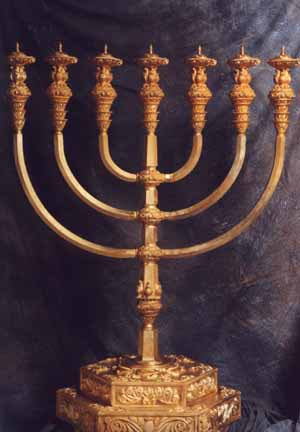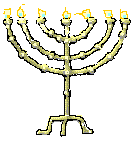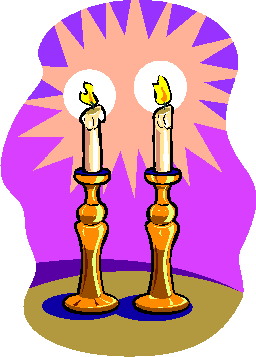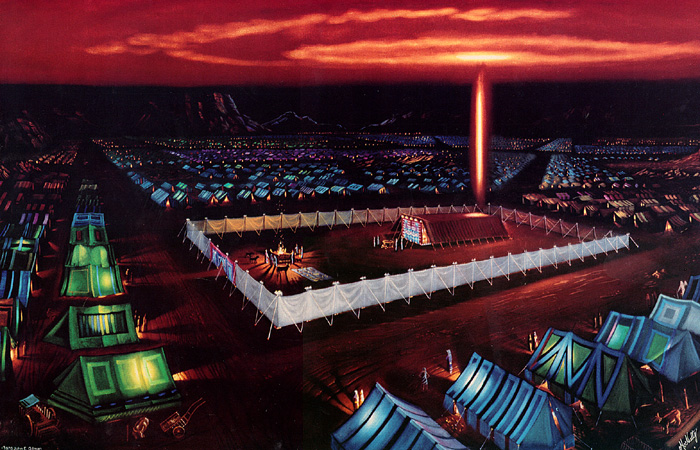|
|
- .
- ,
- Some have
asked: "Why two candles?"
- The story
begins with the Tabernacle/Temple,
- and the Holy Day
called, the Last Great
Day! (Lev.23:36)
- .
- The Tabernacle in
the time of Moses.
..
|
|
-
When many think of
GOD,
-
they first think of a bright light.
-
A v-e-r-y bright light.
- .
 Between miracles,
GOD's Light was represented by the
7 branched lamp stand (called the Menorah in Hebrew), which lights up the
interior of the Temple. This concept was reinforced by the miracle
of Hanukkah. Between miracles,
GOD's Light was represented by the
7 branched lamp stand (called the Menorah in Hebrew), which lights up the
interior of the Temple. This concept was reinforced by the miracle
of Hanukkah.
The
problem with the Temple Menorah was that very few people ever saw
it
because entry into the Temple was only for the priests. The public
representation of YHWH's Light unto the world was reflected in the last
Holy Day of the year called, 'the Last Great Day'. It is held on the
eight day after the 7-day Tabernacles festival, (Lev.23:36). It is the culmination of the
yearly Holy Days. It is the last act in the great
spiritual opera, taking a-l-l humanity from chaos to eternity.
 The Temple history of this
Holy Day contained two beautiful and moving ceremonies:
The ritual of “the
Pouring of Water,” and the “Lighting of the Temple.”
It pictures for the Hebrew people a most joyous time, as the
Messiah who is the light of the world, pours out the living waters of
the Holy Spirit bringing GOD’S
salvation to all the people. The
day was called in Hebrew, Hoshana Rabba, which means the “Day of
Hosanna.”
The Temple history of this
Holy Day contained two beautiful and moving ceremonies:
The ritual of “the
Pouring of Water,” and the “Lighting of the Temple.”
It pictures for the Hebrew people a most joyous time, as the
Messiah who is the light of the world, pours out the living waters of
the Holy Spirit bringing GOD’S
salvation to all the people. The
day was called in Hebrew, Hoshana Rabba, which means the “Day of
Hosanna.”
The
Temple priests divided themselves into three large groups, with each
group heading off out of the city in different directions.
One group set off to Bethlehem to purchase animals for the
sacrifice. Another group traveled in procession to a place below
Jerusalem called Motza, where they cut willow branches.
The third group took a golden flagon with them to the Pool of
Siloam, to draw three measures of water to be used in the ritual of
“the Pouring of Water.”
The
climatic ending came when all three groups returned to the Temple in
procession for the ceremony of “the Lighting of the Temple.”
Following the three groups of priests were tens of thousands of
pilgrims who would flood the streets of Jerusalem and crowded into the
Temple mount area. Each one would be carrying a lighted torch.
And then four huge oil-burning vats were lit.
They were so bright that they actually beamed shafts of light
across the city like search lights do today.
The soft candle light
reflected off the natural cream-colored limestone of the buildings, bringing a magical
glow to Jerusalem.
The entire city was illuminated for miles.
It was a wonderful breathtaking sight,
Then
they placed their sacrifices upon the altar and the willow bearing
priest placed their willow branches around the altar forming a canopy
over the sacrificial animals. Lastly,
a priest would then take the golden flagon and pour the water into a
basin at the foot of the altar while his assistant poured measures of
wine into another bowl. As
this was taking place, the priests blew their trumpets and all the
people waved palm branches while singing praises from Psalms ch.113-118,
and calling the festival “the season of our joy.”
Yahshua
chose this electrifying moment to make an astonishing announcement to
the crowd in the Temple courtyard.
The Apostle John records in 7:37, “On the last day, that great
day of the feast, Jesus stood and cried out, saying, “If anyone
thirsts, let him come to Me and drink.” Yahshua’s symbolism was loaded with meaning to the Jews who
witnessed it. The tragedy
today is, that most in the church haven’t got a clue.
The
stunning symbolism also becomes prophetic as we are reminded of the
ultimate price of love He paid when John continues in vs.38, “He
who believes in Me, as the Scripture has said, out of his heart will
flow rivers of living water.”
Later John writes of Yahshuas’ crucifixion in 19:34, “. .
. one of the soldiers pierced His side with a spear, and immediately
blood and water came out.”
.
 The
Home Festival-Lights
The
Home Festival-Lights



- "For thou will light
my candle..."
- Psalm 18:28
-
- "Blessed [are] the
people that know the joyful sound:
- they shall walk, O in the
light of thy countenance..."
- Psalm 89:15
-
- "I have come as the
light into this world
- that all who believe in me
- might not remain in the
darkness"
- John 12:46
The oldest continually
observed holiday on earth, Passover,
begins the yearly Holy Day season. Passover clearly shows that GOD empowers the individual. This first Holy
observance of the year begins with the family, home worship, and the home Festival Lights.
For
those who can see, it is loaded with spiritual symbolism. There
can be other candles in the background, but the focal point is always with
two prominent candles.
Passover, like the Sabbath rest, shows that the home Holy Day observance centers on the
main meal of the day. In Christianity it is called "Table
Fellowship" and it is modeled after the Last - Passover -
Supper. When the table is set, everyone has taken their
seats, and all is ready and quiet, it is the woman’s voice that has
incredible spiritual power. Not the scolding or sarcastic tone, but
the soothing motherly voice, as she begins the Sabbath, or Holy Day
observance by reciting the opening blessing, or leading the prayer. This
turns an ordinary meal into a Sacred Meal because it
means, at YHWH'S appointed time, you are literally having a meal with HIM,
and HIS good Angels, as a sign of peace, (Deu.12:5-7; Rev.3:20).
To kindle the candles is the woman’s honor, because the seed of
a virgin will bring forth the light of the Messiah to the world,
(Gen.3:15; Isa,7:14). Traditionally, while wearing her favorite prayer shawl, the
lady of the house kindles the two candles, and gives the blessing: “Blessed
art thou, O Lord our God, (or, dear YHWH) King of the Universe, who has set us apart by
your commandments and has commanded us to kindle the Sabbath lights.”
(Replace the word Sabbath for any Holy Day.) When the candles are
lit, enjoy the peaceful moment with family prayer or a moment of silence.
Just for the record, anyone - man or woman - can
accomplish this duty, usually performed at sunset beginning the Holy Day
or later in the day at the Sacred Meal. A table-top 7-candle Menorah,
or two candles can be used. And one can develop their own personal
observance and prayer. For example: One can
kindle the candles, and then say the Messiah's prayer together,
(Mat.6:9-15). What is important is that one recognizes
the important spiritual meaning of the day.
.
 Why
two candles? One signifies creation, and the second signifies redemption.
It is a beautiful spiritual picture symbolized on the weekly Sabbath or
Holy Day table.
Why
two candles? One signifies creation, and the second signifies redemption.
It is a beautiful spiritual picture symbolized on the weekly Sabbath or
Holy Day table.
One
candle represents YHWH, YAHWEH, who
"created the heavens and the earth,” (Gen.1:1).
The
second candle represents the redemption and salvation.
Humanities salvation is also pictured by the shed
blood of the Passover lamb, which is sacrificed for us! It is also pictured
in Yahshua, "In
Him we have redemption through His blood, the
forgiveness of sins, according to the riches of His grace," Eph.1:7.
.
To the believer, the two candles reveal a blessed
picture of our Messiah Yahshua, who sits on the right hand of His
FATHER, YHWH, (Mar.16:19). As one looks at the
lights, we remember Him who said, "I am, the Light of the World. He who follows Me shall not walk in darkness, but have the light of life."
John 8:12.
.
Lastly, the flame on the candle pictures the Ruach
HaKodesh, or the Holy Spirit of YHWH as described in Acts 2:3-4,
" Then there appeared to them divided tongues, as of fire, and one sat upon each of them.
And they were all filled with the Holy Spirit..."

Copyright © 2000-2010 White Stone
Communications - HomeWorship101.com
Last modified: September 05, 2010
|
 Bible
Boot- Camp
[ Top GOD | Sacred
Scrolls | Re-Creation
of the Earth | Order
of Melchizedek | Sacred
Covenants
| .Hellenism
- Romanism |
Are
You the Messiah? | Age of
Grace | Prophecy
| Mystery of the Bride
|
Conquering
Messiah |
Judgment
Day ]
Bible
Boot- Camp
[ Top GOD | Sacred
Scrolls | Re-Creation
of the Earth | Order
of Melchizedek | Sacred
Covenants
| .Hellenism
- Romanism |
Are
You the Messiah? | Age of
Grace | Prophecy
| Mystery of the Bride
|
Conquering
Messiah |
Judgment
Day ] 


 Between miracles,
GOD's Light was represented by the
7 branched lamp stand (called the Menorah in Hebrew), which lights up the
interior of the Temple. This concept was reinforced by the miracle
of Hanukkah.
Between miracles,
GOD's Light was represented by the
7 branched lamp stand (called the Menorah in Hebrew), which lights up the
interior of the Temple. This concept was reinforced by the miracle
of Hanukkah. The Temple history of this
Holy Day contained two beautiful and moving ceremonies:
The ritual of
The Temple history of this
Holy Day contained two beautiful and moving ceremonies:
The ritual of
 Why
two candles? One signifies creation, and the second signifies redemption.
It is a beautiful spiritual picture symbolized on the weekly Sabbath or
Holy Day table.
Why
two candles? One signifies creation, and the second signifies redemption.
It is a beautiful spiritual picture symbolized on the weekly Sabbath or
Holy Day table.